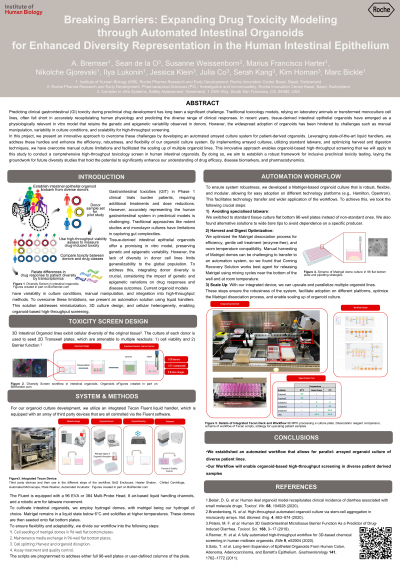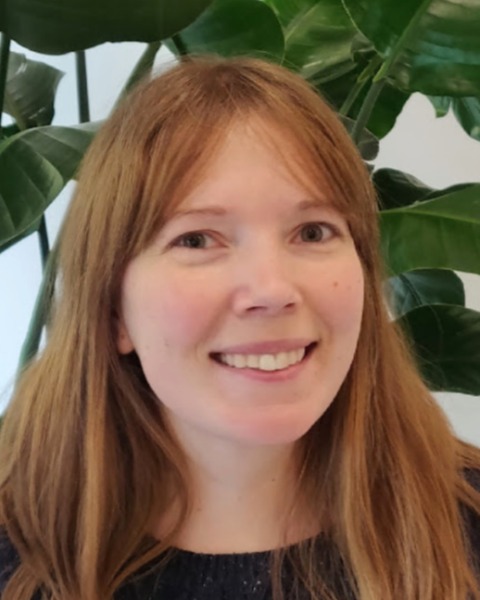Shaping the Future of Therapeutics
Poster Session A
(1108-A) Breaking Barriers: Expanding Drug Toxicity Modeling through Automated Intestinal Organoids for Enhanced Diversity Representation in the Human Intestinal Epithelium
Tuesday, May 28, 2024
16:30 - 17:15 CEST
Location: Exhibit Hall


Anna Bremser (she/her/hers)
Automation Scientist
F. Hoffmann-La Roche Ltd.
Basel, Basel-Stadt, Switzerland
Poster Presenter(s)
Abstract: Predicting clinical gastrointestinal (GI) toxicity during preclinical drug development has long been a significant challenge. Traditional toxicology models, relying on laboratory animals or transformed monoculture cell lines, often fall short in accurately recapitulating human physiology and predicting the diverse range of clinical responses. In recent years, tissue-derived intestinal epithelial organoids have emerged as a physiologically relevant in vitro model that retains the genetic and epigenetic variability observed in donors. However, the widespread adoption of organoids has been hindered by challenges such as manual manipulation, variability in culture conditions, and scalability for high-throughput screening.
In this project, we present an innovative approach to overcome these challenges by developing an automated arrayed culture system for patient-derived organoids. Leveraging state-of-the-art liquid handlers, we address these hurdles and enhance the efficiency, robustness, and flexibility of our organoid culture system. By implementing arrayed cultures, utilizing standard labware, and optimizing harvest and digestion techniques, we have overcome manual culture limitations and facilitated the scaling up of multiple organoid lines. This innovative approach enables organoid-based high-throughput screening that we will apply to this study to conduct a comprehensive high-throughput toxicology screen in human intestinal organoids. By doing so, we aim to establish a robust framework for inclusive preclinical toxicity testing, laying the groundwork for future diversity studies that hold the potential to significantly enhance our understanding of drug efficacy, disease biomarkers, and pharmacodynamics.
In this project, we present an innovative approach to overcome these challenges by developing an automated arrayed culture system for patient-derived organoids. Leveraging state-of-the-art liquid handlers, we address these hurdles and enhance the efficiency, robustness, and flexibility of our organoid culture system. By implementing arrayed cultures, utilizing standard labware, and optimizing harvest and digestion techniques, we have overcome manual culture limitations and facilitated the scaling up of multiple organoid lines. This innovative approach enables organoid-based high-throughput screening that we will apply to this study to conduct a comprehensive high-throughput toxicology screen in human intestinal organoids. By doing so, we aim to establish a robust framework for inclusive preclinical toxicity testing, laying the groundwork for future diversity studies that hold the potential to significantly enhance our understanding of drug efficacy, disease biomarkers, and pharmacodynamics.
